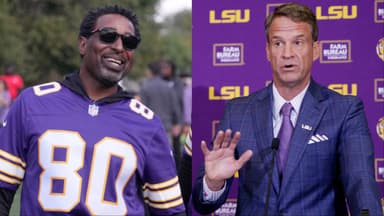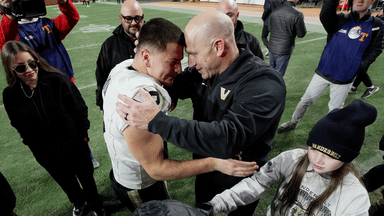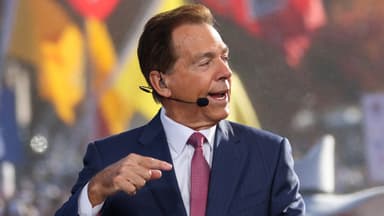College football head coaches have never been a beacon of personal fitness, to say the least. Substance abuse, weight issues, and poor diets are often staples of the profession. For the head coach of the Ole Miss Rebels, Lane Kiffin, it was the former.
Advertisement
After years of alcoholism and having his pictures at bars go viral on the internet, the veteran play caller decided that it was time to make a change for the better.
Instead of electing to try the cold turkey method, Kiffin took things a step further. By implementing a cleanse diet, one which featured “no red meat, no bread, no alcohol,” Kiffin began to feel significantly better. During a recent appearance on The Pivot Podcast, the star head coach detailed his realization that he was selling himself short.
“For me, it was getting sober not just physically, but having emotional sobriety. It’s one thing just to not drink, it’s another thing to get yourself really figured out and really calm and having emotional sobriety. I can deal with these things, I can let them go. I can figure out how to deal with them and I just got to a point where I am not the best version of myself… I just felt like this isn’t the full me.”
After a few months, he found himself questioning the reasons as to why he would ever want to go back to his original lifestyle, as he asserted “I’m the best version of myself.” While his willpower and ability to put an end to bad habits should be commended, Kiffin credited his children and family for being the ultimate motivators behind his transformation.
“I wasn’t fully present when I’d finally go home. I’d go home and I’d have to have a couple drinks, I’ve been working all week. Ya know? Then, I’m not really paying attention at their games, stuff like that. Then I’m like, wait, I’m giving my best version of myself at work but not at home, not for the kids… I didn’t hit a rock bottom, I just got tired of digging.”
Kiffin’s story stands as a testament to the path of redemption that awaits countless members of the football community, although unfortunately, it is not an uncommon one. New York Jets legend Joe Namath previously detailed his similar experience in his tell-all biography, All the Way: My Life in Four Quarters.
The former quarterback famously shared that he’d “…probably be dead by now if I hadn’t stopped drinking.” These stories highlight an overarching problem of substance abuse that exists within the world of gridiron football.
The testosterone-fueled, high-risk, high-reward nature of football tends to appeal to certain demographics, ones that often feature a predisposition to impulsiveness and substance abuse. While it may be entertaining to see the occasional meme about a Georgia football player catching a DUI, the reality of the situation is that substance abuse is a relatively widespread issue within the football community.
When the thrills of scoring touchdowns and securing large contracts go away, players and coaches may reach for the bottle in hopes of filling that emotional void. So long as the issues persist, college programs and organizations such as the National Football League will be encouraged to continue providing an ever-expanding scope of resources to their players.
Kiffin’s journey to sobriety will hopefully encourage those in need to make the necessary changes, but this is an issue that the football community must confront as a whole.

![Mississippi Rebels head coach Lane Kiffin is interviewed after the game while holding the Ash Verlander Champions Trophy of the TaxSlayer Gator Bowl Thursday, Jan. 2, 2025 at EverBank Stadium in Jacksonville, Fla. Ole Miss defeated Duke 52-20. [Corey Perrine/Florida Times-Union]](https://cdn-wp.thesportsrush.com/2025/04/54037e0d-untitled-design-2025-04-19t110920.344.png?format=auto&w=3840&q=75)





